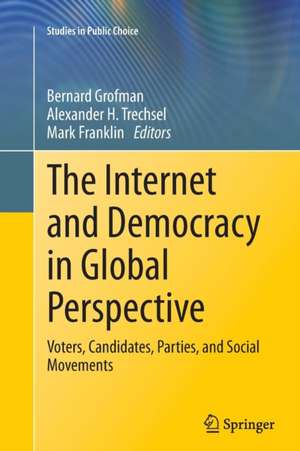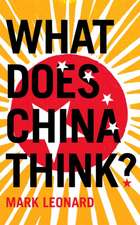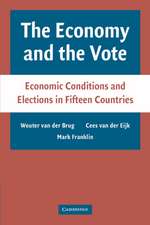The Internet and Democracy in Global Perspective: Voters, Candidates, Parties, and Social Movements: Studies in Public Choice, cartea 31
Editat de Bernard Grofman, Alexander H. Trechsel, Mark Franklinen Limba Engleză Paperback – 3 sep 2016
| Toate formatele și edițiile | Preț | Express |
|---|---|---|
| Paperback (1) | 380.25 lei 6-8 săpt. | |
| Springer International Publishing – 3 sep 2016 | 380.25 lei 6-8 săpt. | |
| Hardback (1) | 385.62 lei 6-8 săpt. | |
| Springer International Publishing – 17 mar 2014 | 385.62 lei 6-8 săpt. |
Din seria Studies in Public Choice
-
 Preț: 542.83 lei
Preț: 542.83 lei - 18%
 Preț: 958.38 lei
Preț: 958.38 lei - 20%
 Preț: 579.90 lei
Preț: 579.90 lei - 18%
 Preț: 780.82 lei
Preț: 780.82 lei -
 Preț: 395.09 lei
Preț: 395.09 lei - 5%
 Preț: 370.58 lei
Preț: 370.58 lei -
 Preț: 381.81 lei
Preț: 381.81 lei - 18%
 Preț: 1228.77 lei
Preț: 1228.77 lei - 15%
 Preț: 637.46 lei
Preț: 637.46 lei - 18%
 Preț: 942.63 lei
Preț: 942.63 lei - 15%
 Preț: 640.71 lei
Preț: 640.71 lei - 15%
 Preț: 633.53 lei
Preț: 633.53 lei - 18%
 Preț: 945.62 lei
Preț: 945.62 lei - 20%
 Preț: 560.55 lei
Preț: 560.55 lei - 18%
 Preț: 947.50 lei
Preț: 947.50 lei - 15%
 Preț: 632.37 lei
Preț: 632.37 lei - 15%
 Preț: 635.15 lei
Preț: 635.15 lei - 15%
 Preț: 634.49 lei
Preț: 634.49 lei - 15%
 Preț: 635.01 lei
Preț: 635.01 lei - 15%
 Preț: 638.89 lei
Preț: 638.89 lei -
 Preț: 381.81 lei
Preț: 381.81 lei - 15%
 Preț: 640.88 lei
Preț: 640.88 lei -
 Preț: 385.62 lei
Preț: 385.62 lei -
 Preț: 393.13 lei
Preț: 393.13 lei - 15%
 Preț: 697.00 lei
Preț: 697.00 lei - 15%
 Preț: 586.70 lei
Preț: 586.70 lei -
 Preț: 389.31 lei
Preț: 389.31 lei - 15%
 Preț: 643.84 lei
Preț: 643.84 lei - 18%
 Preț: 727.00 lei
Preț: 727.00 lei
Preț: 380.25 lei
Nou
Puncte Express: 570
Preț estimativ în valută:
72.76€ • 75.97$ • 60.22£
72.76€ • 75.97$ • 60.22£
Carte tipărită la comandă
Livrare economică 04-18 aprilie
Preluare comenzi: 021 569.72.76
Specificații
ISBN-13: 9783319380308
ISBN-10: 3319380303
Pagini: 157
Ilustrații: IX, 148 p. 13 illus., 6 illus. in color.
Dimensiuni: 155 x 235 x 9 mm
Greutate: 0.23 kg
Ediția:Softcover reprint of the original 1st ed. 2014
Editura: Springer International Publishing
Colecția Springer
Seria Studies in Public Choice
Locul publicării:Cham, Switzerland
ISBN-10: 3319380303
Pagini: 157
Ilustrații: IX, 148 p. 13 illus., 6 illus. in color.
Dimensiuni: 155 x 235 x 9 mm
Greutate: 0.23 kg
Ediția:Softcover reprint of the original 1st ed. 2014
Editura: Springer International Publishing
Colecția Springer
Seria Studies in Public Choice
Locul publicării:Cham, Switzerland
Cuprins
Preface.-Acknowledgments.- Introduction.- Internet Voting in a Local Election inCanada.- IndirectCampaigning: Past, Present and Future of Voting Advice Applications.- Digital Media and the 2010 National Electionsin Brazil.- Online Campaign Communications(Facebook, Twitter, and Websites) in the 2010 UK Elections.- Virtual Power Plays: Social Movements,Internet Communication Technology, and Political Parties.- On the Role of Texts, Tweets, and Status Updates inNonviolent Revolutions.- Bibliography.-Index.
Textul de pe ultima copertă
This volume provides an important update to our current understanding of politics and the internet in a variety of new contexts, both geographically and institutionally. The subject of e-democracy has morphed over the years from speculative and optimistic accounts of a future heightened direct citizen involvement in political decision-making and an increasingly withered state apparatus, to more prosaic investigations of party and governmental website content and micro level analyses of voters’ online activities. Rather than levelling the communications and participation playing field, most studies concluded that existing patterns of bias and power distribution were being repeated online, with the one exception of a genuine change in the potential for protest and e-activism. Across all of these accounts, the question remains whether the internet is a levelling communication tool that elevates the profile of marginalised players in the political system, or whether it is a medium that simply reinforces existing power and participatory biases. While employing case studies from various global perspectives, this book investigates the role of digital media and competitive advantage, campaigns and the effect of social media, online communication as way of fomenting nonviolent revolutions and the undeniable and important role of the internet on democracy around the world.
Caracteristici
Addresses the timely topic of the Internet and social media in elections and democracy Features contributions from the world's leading experts Includes case studies from around the world Includes supplementary material: sn.pub/extras














